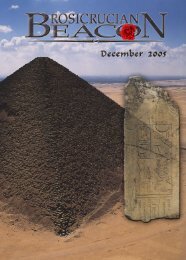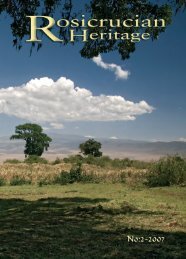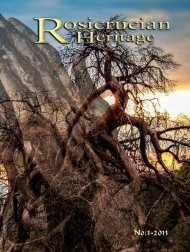Part 2 - AMORC
Part 2 - AMORC
Part 2 - AMORC
You also want an ePaper? Increase the reach of your titles
YUMPU automatically turns print PDFs into web optimized ePapers that Google loves.
Boehme and Abu Hamid Muhammad al Ghazzali,were devout advocates of one of the great worldreligions. Not all mystics were Christian; there wereprominent Jewish and Islamic mystics as well. ForMysticism is the doctrine and practicewhere we attempt a personal union inconsciousness with our concept of God.instance, the Sufis are Islamic mystics whose writingsare very illuminating.The Supreme BeingThese renowned mystics and many others likethem knew through personal experience that theenlightenment and ecstasy provided by mysticismare an individual attainment. There is no need forany religious creed. However, if a mystic is also amember of a religious sect he will then be inclinedto define the transcendental power with whichhe personally seeks union in the terminology andimages of that particular sect.However, there are mystics who are nonsectarian.They do not consider the SupremeBeing to be some divine person. To these mysticsa metaphysical and abstract term represents thepower they consider universal and which theybelieve infuses their being. To them such terms asCosmic Mind and Universal Consciousness have asignificant meaning. The term Supreme Being, is notconstrued by mystics to mean a single entity; rather,it refers to the Whole, the Absolute, the One ofwhich all is an integral part.Mystics have often been contemptuouslycalled atheists by illiberal clergy. In effect, theyimply that we can have no personal experienceof reality through the medium of our own sensesand mind, and that it must be experienced throughthe specific channels determined by their religion.This attitude denies the possibility of a so-called“Afflatus of the Soul” or spiritual attainment outsidethe bounds of a religious creed.There have long been men and women,termed pagans, who do not belong to any of theestablished religions yet have shown reverence forthe magnitude and grandeur of nature. They too areawed by the finite nature of man in comparison withthat mysterious infinity of phenomena existing in,around and beyond humankind. They also have thedesire to know and understand this phenomenon.Out of these feelings of intermingled awe andreverence there emerged magic and thereafterreligion.Those more liberated mystics, who wantto know, to become aware of the great infinitythrough personal experience, are often alsopantheists. To pantheists such as Spinoza thereis an indwelling divine power, an intelligenceor order that permeates all nature. Everything isconceived to be of this reality. Pantheist may say thatall things are infused with God or some intelligence.Yet, like Spinoza, the pantheist will say that thetotality of all things is not God. The real pantheistwill say instead that all manifestations of nature areimpregnated with this infinite or divine quality, yetno total of such can ever equal it. The reason givenis that this Cosmic Cause, or whatever term youmay use, is not limited by any number. It is infiniteand therefore, no finite number can represent itsentirety.As mystical pantheists, we as Rosicrucians donot worship any particular object or phenomenon ofnature. We seek a union with that of which all natureconsists, and of which we are one of its creations.Through our observation of nature we experience amystical attunement which causes us to feel that weare embracing the infinite even if but momentarily.Giordano Bruno, who was burned at thestake in Rome in 1600 for his views, is an example ofa pantheistic mystic. Bruno extolled the idea of theThe term Supreme Being refers to theWhole, the Absolute, the One of whichall is an integral part.unity of all expressions of reality: “It is not reasonableto believe that any part of the world is without a soul life,sensation and organic structures. From this infinite all,full of beauty and splendour, from the vast worlds whichcircle above us to the sparkling dust of the stars beyond,the conclusion is drawn that there are an infinity ofcreatures, a vast multitude which, in its degree, mirrorsforth the splendid wisdom and excellence of the DivineBeauty.”Who can truly separate the finite from theinfinite? Where does one begin and the other leaveoff? If this separateness is not evident, then is notoneness their nature?The world is as good as we see it and goodness is only as we value it.—ValidivarThe Rosicrucian Beacon -- June 200823











